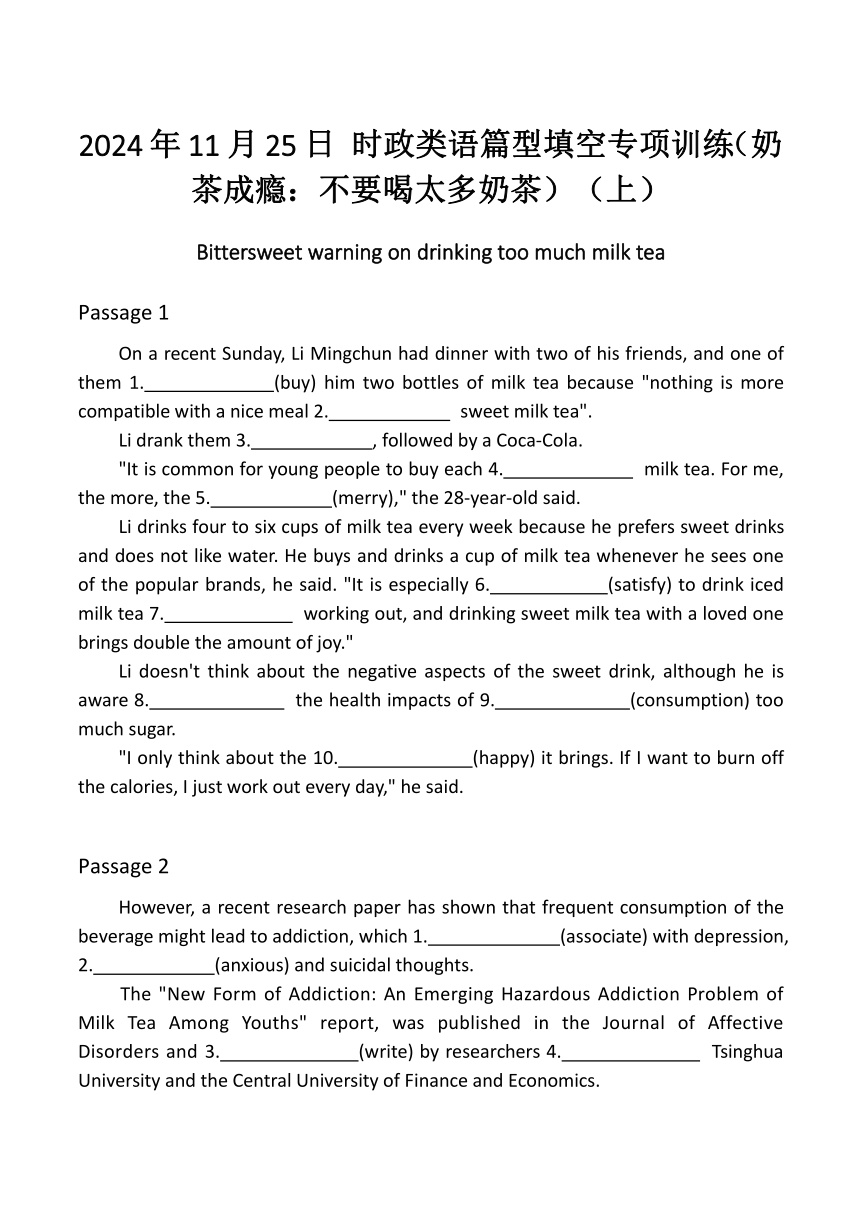
2024年11月25日 时政类语篇型填空专项训练(奶茶成瘾:不要喝太多奶茶)(上) Bittersweet warning on drinking too much milk tea Passage 1 On a recent Sunday, Li Mingchun had dinner with two of his friends, and one of them 1. (buy) him two bottles of milk tea because "nothing is more compatible with a nice meal 2. sweet milk tea". Li drank them 3. , followed by a Coca-Cola. "It is common for young people to buy each 4. milk tea. For me, the more, the 5. (merry)," the 28-year-old said. Li drinks four to six cups of milk tea every week because he prefers sweet drinks and does not like water. He buys and drinks a cup of milk tea whenever he sees one of the popular brands, he said. "It is especially 6. (satisfy) to drink iced milk tea 7. working out, and drinking sweet milk tea with a loved one brings double the amount of joy." Li doesn't think about the negative aspects of the sweet drink, although he is aware 8. the health impacts of 9. (consumption) too much sugar. "I only think about the 10. (happy) it brings. If I want to burn off the calories, I just work out every day," he said. Passage 2 However, a recent research paper has shown that frequent consumption of the beverage might lead to addiction, which 1. (associate) with depression, 2. (anxious) and suicidal thoughts. The "New Form of Addiction: An Emerging Hazardous Addiction Problem of Milk Tea Among Youths" report, was published in the Journal of Affective Disorders and 3. (write) by researchers 4. Tsinghua University and the Central University of Finance and Economics. The research was based 5. a study of 5,281 college students in Beijing in 2022. The study 6. (find) that nearly 77 percent of the survey 7. (participate) drank at least six to 11 cups of milk tea in 2021. 8. them, 2.6 percent of students drank four to six cups of milk tea each week, while 20.6 percent drank two to three cups a week. Milk tea addiction 9. (measure) by several parameters, such as frequent milk tea consumption, persistent craving, guilty 10. (feel) for drinking too much, and an inability to stop imbibing the beverage. Passage 3 A plausible 1. (explan) is that milk tea, being a sweet beverage, 2. (contain) a significant amount of sugar. Other research has demonstrated that a high-fructose diet can elevate cortisol levels leading to dysregulation, the 3. (able) to control or regulate emotional 4. (respond), of the hypothalamic-pituitary-adrenal axis. The axis is a 5. (communicate) system between three organs. It is responsible 6. helping manage stress and has profound effects on emotions and 7. (behave), according to the paper. The results of the study have crucial implications for policymakers, as milk tea addiction may pose a severe problem among youth, the paper said. It 8. (advice) policymakers 9. (consider) enacting regulations for the milk tea industry. Measures could include regulating milk tea 10. (advertise), introducing educational programs on the detrimental effects of addiction on mental health, and intro ... ...
~~ 您好,已阅读到文档的结尾了 ~~

